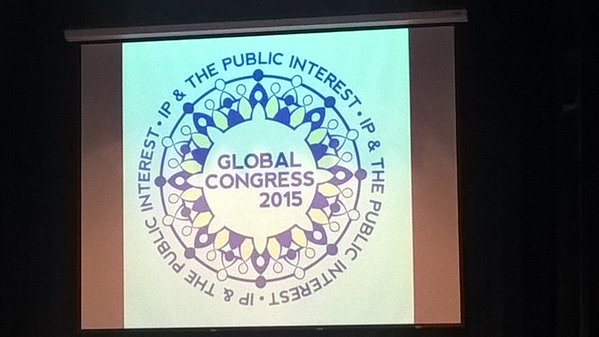Recap of 2015 4th Global Congress on Intellectual Property and the Public Interest
- Victor Nzomo |
- December 22, 2015 |
- CIPIT Insights,
- Intellectual Property,
- openAIR,
- Public Interest

In the midst of two decades of TRIPs and three decades of openness, 400+ delegates from over 50 countries, ranging from established academics to activists to students converged in New Delhi for the 4th Global Congress on Intellectual Property and the Public Interest (GCIP). Right from the inaugural plenary session, delegates were called to reflect on the progress of the Global Congress in the re-articulation of a public interest agenda in Intellectual Property (IP).
Over a period of three days, GCIP delegates met at the prestigious National Law University, Delhi to discuss a host of topics under four broad themes: Users’ Rights, Openness, IP and Development and Access to Medicines. Some of the outcomes from the various panel discussions were tweeted using the hashtags #GCIP15 and #GCIP2015.
During the discussions on how openness and public interest-oriented IP have fared in the post-TRIPs world, the proliferation of IP policy in trade was clearly highlighted by the recent multilateral trade agreement, the Trans-Pacific Partnership (TPP) whose potential negative impacts on the public interest have been exposed by civil society. With respect to these types of Trade Agreements, a major concern was the use of internal private dispute settlement measures which would lead to secret, opaque, unaccountable arbitration fora deciding matters of public importance such as access to medicines. To counter this development, it was proposed that BRICS and other groupings of developing countries should enter their own FTAs, which would potentially allow such countries to have more leverage in trade and investment.
Aside from trade, IP policy in the post-TRIPs era has spread to other areas including internet governance, telecommunications, e-commerce and privacy, among others. Therefore it is important for civil society to keep up and adapt to how IP is now being framed and shaped in the context of these key overlapping areas. For instance, in the context of e-trade, the rise of giant cross-border e-commerce platforms such as Alibaba has led to provisions in multi-lateral trade agreements that require IP maximalism contrary to established provisions such as the ‘De Minimis’ provision in Article 60 of TRIPs. Similarly, in the context of e-commerce, new trade agreements such as the TPP emphasise the obligations of intermediaries. This use of intermediary liability is also becoming more prevalent in enforcement of trademarks and patents.
During the reflections on two decades of TRIPs and three decades of openness, the need to counter the popular narrative of IP as a driver of innovation was repeatedly stressed. TRIPS is an instrument meant to further IP driven innovation based on the premise that higher IP protection will attract investment and transfer of R&D. However there are a lot of areas where innovation has not happened despite the presence of TRIPS-compliant laws. For instance, there are countries with stronger IP laws than the US, yet companies have not shifted to those countries. There are many countries in Africa today that have TRIPS-complaint IP laws, yet has this resulted in transfer of R&D from the US to local companies in these countries? Even after two decades of TRIPS and links drawn between stronger IP laws and innovation, innovation is confined to a handful of countries. Therefore it was submitted that the innovation space is a complex ecosystem and IP is only one of the factors that have an effect on the ecosystem and not the sole determinant as the current IP narrative makes it out to be. This point is adequately addressed and illustrated through empirical and evidence-based research carried throughout Africa under the Open A.I.R project.
After three productive days of deliberations and exchanges, one important reflection during the closing plenary was the need for more evidence-based research and capacity building initiatives to counter mainstream IP narratives. Coupled with this reflection is the challenge of translating the kinds of research and evidence presented at GCIP into content and value for advocacy and policy-making. The concluding recommendations from the User Rights and IP and Development Tracks at GCIP are available here and here respectively.
